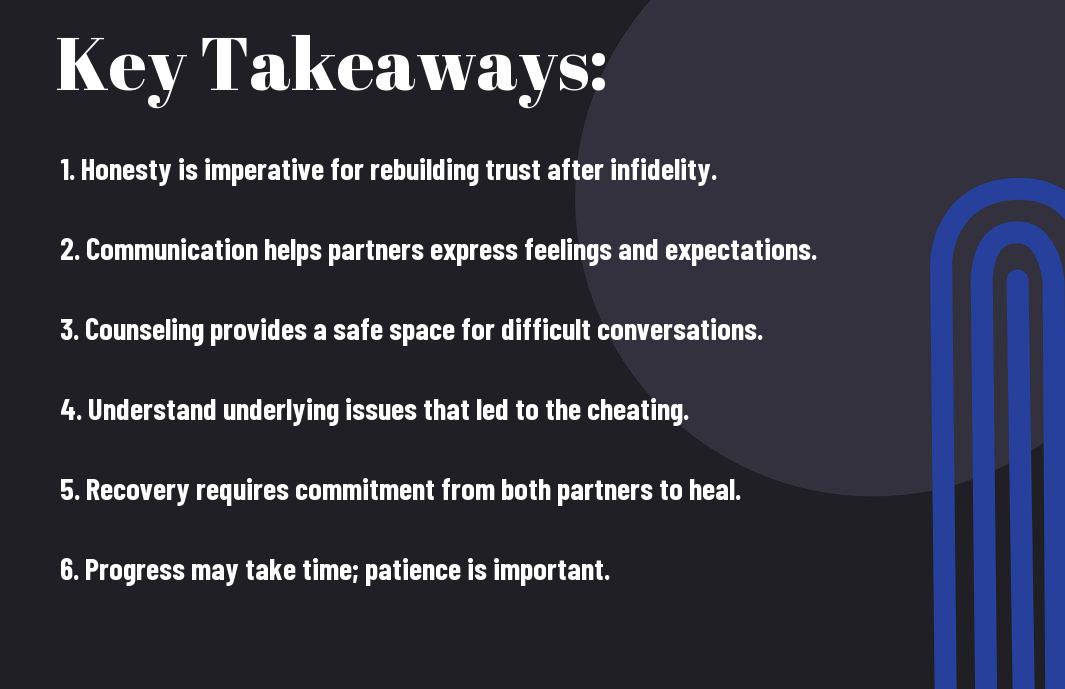Over the course of a relationship, infidelity can strike, leaving you feeling betrayed and uncertain about the future. Seeking relationship counseling after cheating is a significant step that can help you navigate your feelings and rebuild trust. In this blog post, you will learn what to expect from counseling, how it can facilitate healing, and strategies to strengthen your bond moving forward. Regardless of your situation, recognizing the need for professional support is vital to creating a healthier relationship dynamic.
Key Takeaways:
- Understanding the emotions: Both partners often experience a range of feelings, including betrayal, anger, and confusion, which need to be addressed openly.
- Open communication: Honest dialogue about the infidelity is important for rebuilding trust and ensuring both partners feel heard and valued.
- Seeking professional help: Couples may benefit from support from a licensed counselor who specializes in infidelity to navigate their feelings and responses.
- Focus on rebuilding trust: Re-establishing trust takes time and involves consistent actions and communication from both partners.
- Set boundaries: Discussing and agreeing on boundaries is key to moving forward and preventing future betrayals.
- Assessing relationship goals: Couples should discuss their long-term relationship goals and whether they are willing to work towards healing and resolution.
- Self-care is important: Each partner should prioritize self-care during this challenging time to ensure individual emotional well-being along the healing journey.


Understanding Infidelity
Your journey into relationship counseling after cheating begins with a solid understanding of infidelity. Recognizing the complexities behind the betrayal can help you navigate your feelings, your partner’s response, and the pathway to healing. Infidelity can take many forms, and it’s necessary to grasp what led to this breach of trust to effectively address the issues at hand.
Types of Cheating
- Emotional Affairs: Distinct deep emotional connections outside the relationship
- Physical Infidelity: Engaging in sexual activities with someone else
- Virtual Cheating: Online interactions that cross emotional boundaries
- Micro-Cheating: Small, seemingly innocent behaviors that betray trust
- One-Night Stands: Brief encounters that disregard the primary relationship
Assume that understanding these types can facilitate important conversations about boundaries and expectations in your relationship.
Emotional and Psychological Impact
At the core of infidelity lies a web of emotional and psychological ramifications that both partners must navigate. Betrayal can lead to intense feelings of hurt, confusion, and betrayal, not only for the person cheated on but also for the one who strayed. This emotional fallout often requires professional guidance to unpack the guilt and shame that can overwhelm both parties.
To understand the emotional and psychological impact of infidelity, it’s important to explore how it can shift dynamics within your relationship. You may feel an overwhelming sense of loss, triggering questions about self-worth and your partner’s commitment. The pain may sometimes appear unbearable, leading to a range of emotions, from anger to depression. However, this critical turning point can also serve as a transformative opportunity for growth and rediscovery of trust if addressed with care and open communication.

The Counseling Process
Assuming you and your partner have decided to seek counseling after infidelity, you can expect a structured process that focuses on rebuilding trust and communication. The counselor will guide you through a series of discussions designed to explore the underlying issues that led to the betrayal. Throughout this journey, both partners will have opportunities to express feelings in a safe environment, ultimately working toward healing and strengthening the relationship.
Finding the Right Counselor
On your quest for a suitable counselor, consider seeking someone with expertise in relationship issues and infidelity. Look for professionals who specialize in trauma-informed care and have a solid understanding of the dynamics involved in cheating. Reading reviews and seeking recommendations can also help you find someone who resonates with your needs and goals.
Approaches to Relationship Counseling
About the various methods employed in relationship counseling, you will encounter different therapeutic approaches that can facilitate healing. Each technique aims to address specific challenges and foster understanding between partners, ultimately contributing to relationship growth.
A variety of approaches to relationship counseling exist, such as Emotionally Focused Therapy (EFT), which focuses on identifying the emotional needs of both partners, and Cognitive Behavioral Therapy (CBT), which encourages changing negative thought patterns. Imago Relationship Therapy emphasizes the impact of childhood experiences on adult relationships. By choosing the right method, you can address the root causes of issues and develop healthier communication patterns, leading towards a more fulfilling connection.
Rebuilding Trust
All relationships face challenges, but rebuilding trust after cheating requires patience and commitment. You must be open and transparent with each other, acknowledging the pain caused while actively working towards healing. Engaging in How successful is marriage counseling after infidelity? can help you navigate this complex process, providing tools to foster a safer emotional space. Without trust, the foundation of your relationship may crumble, so investing time and energy into rebuilding it is paramount.
Setting Boundaries
Rebuilding trust involves establishing clear boundaries important to both of you. Discuss what behaviors are unacceptable and set guidelines that promote safety and reassurance in your relationship. It’s vital that you both agree on what these boundaries entail and hold each other accountable as you progress.
Communicating Effectively
Boundaries play a fundamental role in restoring your bond. Effective communication is the key to maintaining these boundaries while expressing your feelings and needs. Instead of pointing fingers, focus on using “I” statements to address your emotions, fostering a more inclusive dialogue. A supportive environment encourages openness and healing while minimizing misunderstandings.
Further, it’s imperative to engage in regular conversations about each other’s feelings and progress. Listening without judgment is just as important as articulating your emotions. Check in with each other frequently to avoid letting unresolved issues fester, as this can lead to further distress and potential relapse. Consistency in communication will solidify the framework necessary to rebuild trust effectively.
Coping Strategies for the Betrayed Partner
Despite the overwhelming pain of betrayal, finding effective coping strategies is imperative for your healing journey. Acknowledge your feelings and allow yourself the time and space to process the emotions that arise. Surround yourself with supportive friends and family who can lend a listening ear, and consider professional counseling to help navigate this difficult terrain. Your well-being should be a priority as you work towards healing.
Emotional Healing
By addressing your emotional wounds head-on, you can begin to regain control over your feelings and foster resilience. Engage in open conversations with trusted friends or therapists, and utilize journaling as a tool to articulate your thoughts and emotions. It’s vital to face the pain rather than suppress it, allowing yourself the freedom to heal.
Self-Care Practices
Any self-care practices you adopt will play a significant role in your recovery process. Focus on consuming a balanced diet, ensuring regular exercise, and getting enough restful sleep. Prioritizing activities that bring you joy, such as hobbies or mindfulness practices, can help restore your sense of self and promote emotional balance.
Further, investing time in self-care practices serves as an effective counterbalance to the emotional turmoil you might be experiencing. Engage in mindfulness or meditation to promote a sense of calm and clarity. Explore activities that uplift your spirit, like spending time in nature, practicing yoga, or immersing yourself in creative outlets. Nurturing your body and mind will not only help you heal but will also lay a strong foundation for your future, whether you decide to heal your relationship or move on to new possibilities.
Moving Forward Together
After a betrayal, taking the time to heal and work through the emotions is imperative. You can create a new foundation built on trust and understanding by engaging in open communication and seeking professional support together. Moving forward means committing to the relationship and addressing the underlying issues that led to the infidelity. This shared journey can ultimately strengthen your bond.
Re-establishing Intimacy
To rebuild intimacy, it’s vital to reconnect emotionally and physically. You should explore different ways to express your affection, whether through meaningful conversations, physical touch, or spending quality time together. Creating an environment of safety and vulnerability allows you both to nurture your connection and rediscover the love that initially brought you together.
Setting Goals for the Future
On your journey to healing, it’s beneficial to set shared goals that reflect your renewed commitment to each other. You can work on defining what you each want from the relationship moving forward and how to support one another in achieving these aspirations. Setting aside dedicated time to revisit these goals will help you remain aligned and focused.
Moving forward entails developing a vision for your relationship that incorporates your individual and shared objectives. This may include improving communication, planning future experiences, and addressing boundaries to prevent future issues. By actively working together towards these goals, you reaffirm your commitment and desire for a healthier dynamic, ensuring that both partners feel engaged and valued in the process.
Final Words
Taking this into account, seeking relationship counseling after cheating can be a transformative step for you and your partner. It provides a structured environment to address hurt feelings and rebuild trust, allowing both of you to express your thoughts and emotions openly. By engaging in this process, you can work towards understanding the root causes of the infidelity and establish healthier patterns moving forward. Ultimately, counseling can guide you towards healing and potentially redefining your relationship in a more solid foundation.
FAQ
Q: What is relationship counseling after cheating?
A: Relationship counseling after cheating is a therapeutic approach aimed at helping couples navigate the complex emotions and challenges that arise when infidelity occurs. The goal is to promote healing, rebuild trust, and improve communication skills, enabling both partners to understand each other’s perspectives and work towards a healthier relationship.
Q: How can counseling help after cheating has occurred?
A: Counseling provides a safe space for both partners to express their feelings and concerns. A trained therapist can facilitate difficult conversations, help each partner to understand the underlying issues that contributed to the infidelity, and guide them through the forgiveness process. Ultimately, this support can lead to clearer communication, healing, and a roadmap for rebuilding the relationship.
Q: How long does relationship counseling typically last after an affair?
A: The duration of relationship counseling varies based on the couple’s unique situation, the extent of the issues to be addressed, and their commitment to the process. On average, couples may attend counseling sessions weekly for a few months, but some may find they need more or less time depending on their progress and goals.
Q: What can couples expect in their first counseling session after infidelity?
A: In the first counseling session, couples will typically discuss the context of the relationship and the infidelity. The therapist will encourage both partners to share their feelings, establishing a foundation for open dialogue. The session may also include setting goals for the counseling process and discussing the rules of engagement to ensure a productive and respectful environment.
Q: Is relationship counseling guaranteed to work after cheating?
A: While relationship counseling can be very beneficial for many couples, it is not guaranteed to resolve all issues or restore the relationship. Success largely depends on the willingness of both partners to engage in the process, confront their feelings, and make positive changes. Additionally, each individual’s level of commitment to healing and rebuilding trust plays a significant role in the outcome.
